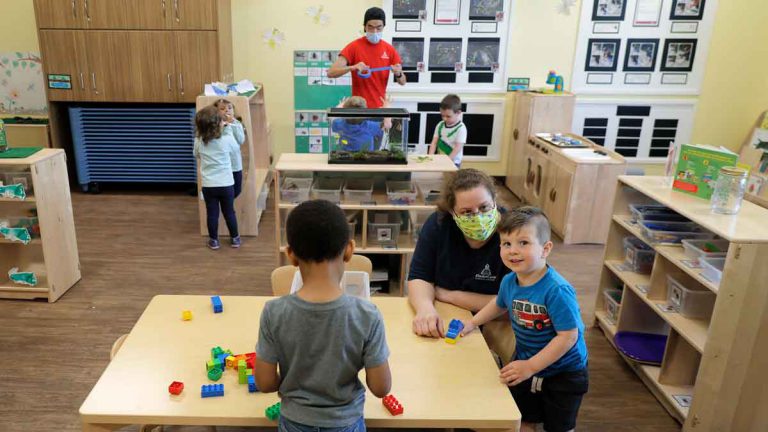CHAMPAIGN – The child care industry, like many others, has been hurt by the COVID-19 pandemic, as many day care centers and home-based child care providers were forced to either close or reduce their capacity as states implemented stay-home orders to slow the spread of the virus.
As businesses slowly reopen, lack of access to affordable child care will likely hurt the economic prospects of women more than men, says University of Illinois economist Elizabeth Powers, a senior scholar with the University of Illinois Institute of Government and Public Affairs and author of a recent report on the topic.
Powers says when there’s a problem with covering childcare, mothers are more likely to be the ones to step out of the labor market. Research shows this trend has held throughout the pandemic, as mothers are 47% more likely than fathers to quit or lose their jobs due to COVID-19-related lockdowns.
“Women are in fact more out of the labor market at this time than men, relative to earlier recessions, and that’s because of their caregiver role,” Powers says. “So as you come out (of the recession) and economically recover, if there’s a problem finding childcare, that’s going to disproportionately fall on mothers.”
Powers says it’s still too soon to say whether there will be enough child care slots for all the children whose parents are being called back to work.
Nationwide surveys show nearly half of the 5,000 day care providers contacted by the National Association for the Education of Young Children ceased operations during the pandemic, she says.
Those that remained open to care for children of essential workers have suffered revenue losses due to public health guidelines requiring they operate at reduced capacity and do more cleaning and sanitization than usual. The capacity constraints affect home-based providers less so than day care centers, which provide the vast majority of Illinois’ child care capacity, she notes.
State and federal funding have been made available to child care providers suffering from revenue losses due to COVID-19, and Powers says the state’s new Child Care Restoration grant program, announced in June, should also help.
“Those are business interruption grants, and they’re designed to explicitly plug the hole caused by the capacity constraints the state is imposing,” she says.
The $270 million program allows providers to apply for reimbursements from the state to cover lost revenue due to capacity constraints and the costs for additional cleaning.
Powers says the grants should help prevent the increased costs of providing care from being passed on to families and keep daycare providers from closing down as the pandemic continues.
Even with financial support, the report finds capacity reductions at daycare could lead to a drop in childcare slots by up to 33% for infants and up to 25% for other age groups.
Powers says additional policy changes that could help increase access to affordable childcare include recruiting more home-based child care providers and increasing the income threshold for the state’s child care assistance program, which currently has a graduated payment system for families earning up to 200% of the federal poverty level.
The child care policy spotlight is part of IGPA’s task force on the impact of the COVID-19 pandemic on the state. Additional reports can be found on the group’s website.
Christine Herman is a reporter for Illinois Public Media. Follow her on Twitter: @CTHerman

